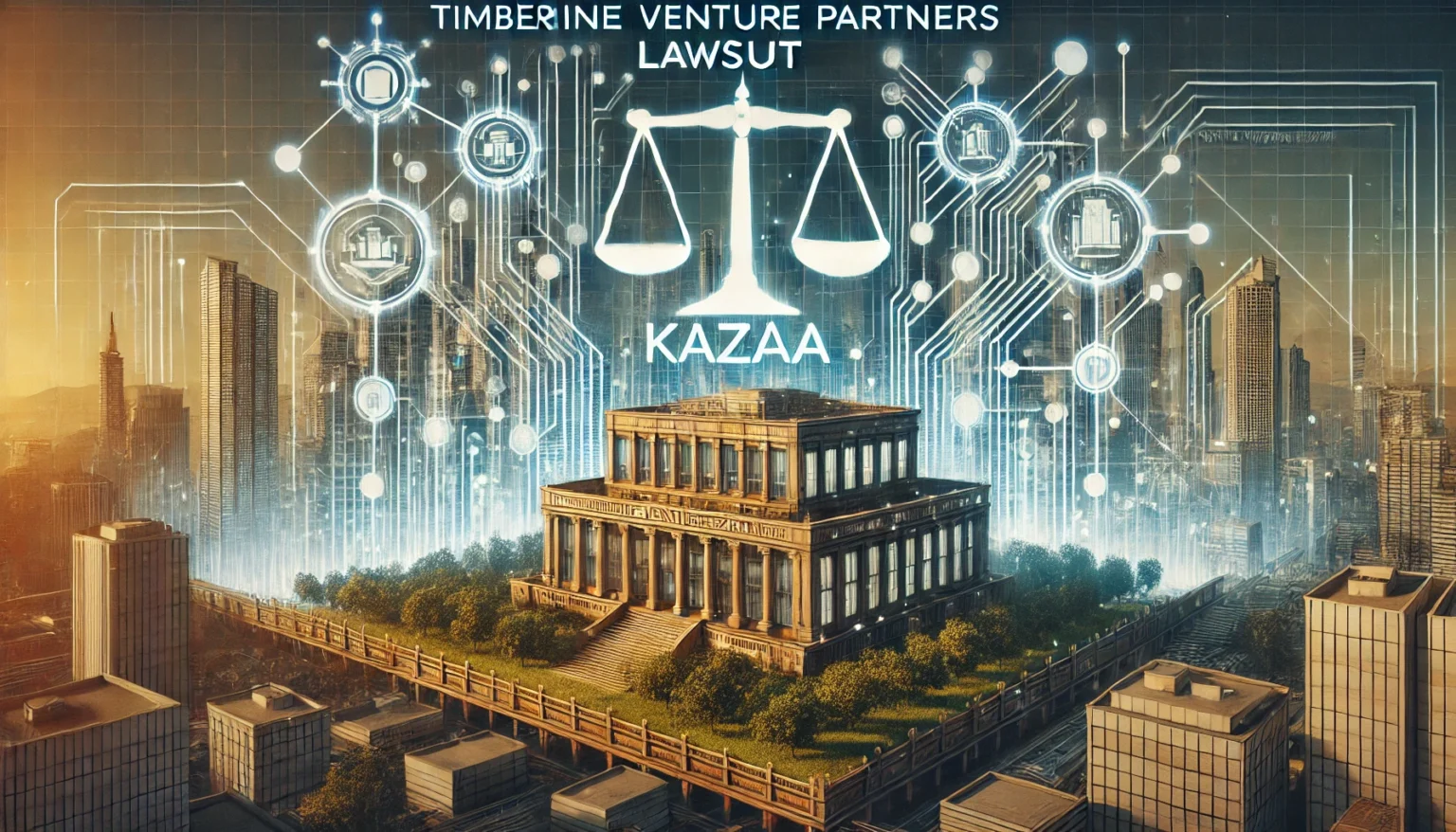The Timberline Venture Partners lawsuit against Kazaa stands as a significant event in the intersection of venture capital and technology law. Kazaa, once a trailblazer in peer-to-peer file-sharing technology, attracted attention not only for its innovative platform but also for the legal challenges it faced during its peak.
At the center of the dispute, Timberline Venture Partners, a prominent venture capital firm, alleged concerns over their investment in Kazaa, sparking a complex legal battle. This case underscored the risks venture capital firms encounter when backing high-growth but legally vulnerable tech startups.
The Timberline Venture Partners lawsuit Kazaa raised critical questions about intellectual property rights and corporate accountability. It also highlighted the tension between innovation and compliance in the rapidly evolving digital media landscape.
This lawsuit remains a pivotal case study for investors and tech entrepreneurs alike, reflecting the delicate balance between opportunity and risk in the tech-driven economy.
The Rise and Fall of Kazaa as a File-Sharing Pioneer
Kazaa was a groundbreaking peer-to-peer (P2P) file-sharing platform launched in 2001. It allowed users to share music, videos, and other files directly, bypassing centralized servers. This innovation made Kazaa one of the most popular P2P platforms of its time, with millions of active users worldwide.
However, Kazaa’s success was short-lived as it became the focus of numerous lawsuits from the music and movie industries. These industries accused Kazaa of enabling copyright infringement on a massive scale, leading to significant financial and legal challenges.
While Kazaa’s decentralized network was revolutionary, its lack of a legal framework for handling copyrighted material became its Achilles’ heel. Competing platforms like BitTorrent later adopted similar technology but incorporated measures to avoid Kazaa’s pitfalls.
In 2006, Kazaa attempted to reinvent itself as a legal digital music platform. Despite this shift, it could not compete with services like iTunes and Spotify, which had already established a legal foothold in the market.
| Kazaa’s Key Milestones | Year |
| Launch as a P2P file-sharing platform | 2001 |
| Legal battles with entertainment industry | 2002-2005 |
| Settlement with major lawsuits | 2006 |
| Attempted relaunch as a legal service | 2006 |
Kazaa’s rise and fall demonstrate the potential of innovative technology to disrupt industries but also highlight the risks of operating in unregulated or legally ambiguous environments.
Timberline Venture Partners Lawsuit Kazaa: What Sparked the Dispute?
The Timberline Venture Partners lawsuit Kazaa stemmed from allegations of misrepresentation and lack of transparency. Timberline, an early investor, claimed that Kazaa failed to disclose the extent of its legal and financial risks during the investment process.
At the heart of the dispute were mounting legal challenges faced by Kazaa. As lawsuits from the entertainment industry intensified, Timberline argued that these risks were downplayed or hidden entirely, jeopardizing their investment.
Another key issue was the mismanagement of funds. Timberline alleged that Kazaa prioritized fighting legal battles over sustainable business development, further undermining the company’s long-term potential.
The lawsuit also pointed to a lack of accountability. Timberline claimed that Kazaa’s leadership did not provide clear communication about the company’s legal status, leaving investors blindsided as liabilities grew.
This case highlighted the critical importance of investor due diligence and the need for startups to maintain transparency and accountability, particularly when navigating high-risk industries.
Major Legal Claims in the Timberline Venture Partners Lawsuit Kazaa Case
The Timberline Venture Partners lawsuit Kazaa centered on several key legal claims, each revealing significant challenges for both parties. The primary allegation was that Kazaa misrepresented its exposure to legal risks, particularly regarding copyright infringement lawsuits.
Timberline also claimed that Kazaa breached its fiduciary duties by failing to act in the best interest of its investors. This included accusations of mismanaging resources and focusing excessively on defending against lawsuits rather than on growth or innovation.
Another critical claim involved transparency. Timberline argued that Kazaa’s leadership withheld crucial information about its financial and legal situation, leaving investors unaware of the platform’s vulnerabilities.
| Major Legal Claims | Details |
| Misrepresentation of legal risks | Failure to disclose extent of liabilities |
| Breach of fiduciary duty | Alleged resource mismanagement |
| Lack of transparency | Inadequate communication with investors |
These claims underscored the need for clearer guidelines regarding corporate governance and investor protections in tech startups, particularly those operating in high-risk industries.
How the Lawsuit Shaped Kazaa’s Future Operations
The Timberline Venture Partners lawsuit Kazaa had a profound impact on Kazaa’s business operations. The legal battle, combined with ongoing lawsuits from the entertainment industry, drained Kazaa’s financial resources and left it unable to innovate or compete.
One significant change was Kazaa’s decision to settle its legal disputes with major entertainment companies. These settlements, while necessary, were costly and further limited the company’s ability to invest in its platform.
The lawsuit also prompted Kazaa to pivot its business model. In 2006, the company relaunched as a subscription-based digital music service in an effort to operate legally. However, this transition came too late, as competitors like iTunes and Spotify had already captured the market.
Kazaa’s reputation also suffered, both among consumers and investors. The platform became synonymous with piracy, making it difficult to rebuild trust or secure new investments.
Ultimately, the legal challenges, including the Timberline lawsuit, forced Kazaa into an operational model that it could not sustain. This serves as a cautionary tale for startups about the importance of addressing legal and regulatory risks early.
Key Legal Issues in the Kazaa Case and Their Implications
The Kazaa case revolved around several pivotal legal issues that shaped the digital media landscape. The primary concern was Kazaa’s role in facilitating copyright infringement. The platform’s peer-to-peer (P2P) model allowed users to share copyrighted music, movies, and software without authorization, leading to lawsuits from major entertainment companies.
Another critical issue was Kazaa’s defense strategy. The company claimed to be a neutral technology provider, arguing that it was not responsible for how users utilized its platform. This defense raised questions about the extent of liability for tech companies operating in unregulated digital spaces.
The legal proceedings also highlighted intellectual property (IP) enforcement challenges. At the time, global IP laws were not robust enough to address the widespread sharing of digital content, exposing gaps in regulatory frameworks.
| Key Legal Issues | Implications |
| Copyright infringement | Redefined the accountability of digital platforms |
| Liability of technology providers | Set standards for P2P platforms |
| IP enforcement | Highlighted global regulatory weaknesses |
These legal issues had a lasting impact, influencing the development of content distribution platforms and reinforcing the need for compliance in tech-driven industries.
The Role of Venture Capital in High-Risk Tech Investments
Venture capital (VC) plays a crucial role in driving innovation by funding high-risk, high-reward startups like Kazaa. These investments enable disruptive technologies to scale rapidly, often pushing the boundaries of traditional business models.
However, the Kazaa case underscored the challenges of investing in legally ambiguous ventures. VC firms, such as Timberline Venture Partners, faced significant risks due to the company’s legal and financial instability.
Bullet Points:
- Capital infusion: VCs provide startups with essential funding to scale operations.
- Strategic guidance: Investors often help startups navigate complex markets.
- Risk exposure: Legal and regulatory issues can jeopardize returns on investments.
The lawsuit highlighted the importance of due diligence in evaluating potential risks, including legal liabilities and market competition. It also stressed the need for investors to maintain active oversight of their portfolio companies to mitigate unforeseen challenges.
Despite the risks, VC investments in emerging tech remain critical for fostering innovation. The lessons learned from Kazaa have prompted many firms to adopt more rigorous evaluation and risk management practices.
Intellectual Property Concerns Highlighted by the Timberline-Kazaa Dispute
The Timberline-Kazaa dispute brought significant attention to intellectual property (IP) concerns, particularly in the context of digital platforms. Kazaa’s P2P model enabled users to bypass traditional copyright protections, creating a massive challenge for IP enforcement.
One major concern was the platform’s lack of safeguards against illegal content sharing. This exposed gaps in Kazaa’s technology design and raised questions about its responsibility for user-generated actions.
The case also highlighted the global nature of IP challenges. With Kazaa operating in multiple jurisdictions, it became evident that inconsistent international IP laws hindered effective regulation and enforcement.
For investors like Timberline Venture Partners, the case underscored the importance of understanding a startup’s IP strategy. Kazaa’s failure to address these issues early on resulted in costly lawsuits and reputational damage.
The Timberline-Kazaa dispute serves as a reminder that startups must prioritize IP compliance, especially in industries where regulatory oversight is evolving.
Timberline Venture Partners Lawsuit Kazaa: Outcomes and Aftermath
The Timberline Venture Partners lawsuit Kazaa had significant outcomes that shaped the future of both parties. The legal battle, rooted in allegations of misrepresentation and mismanagement, concluded with settlements that forced Kazaa to redirect its focus.
For Kazaa, the lawsuit, combined with ongoing legal disputes, led to its financial decline. Settlements with the entertainment industry and Timberline drained resources, leaving little room for innovation or growth. The platform attempted to pivot to a legal subscription-based service in 2006 but failed to regain its market position.
For Timberline, the lawsuit reinforced the importance of investor protections. The case highlighted the risks of investing in disruptive but legally untested ventures, prompting many VCs to adopt stricter evaluation criteria for potential investments.
| Aftermath of the Lawsuit | Impact |
| Kazaa’s financial decline | Loss of market dominance |
| Timberline’s lessons for VCs | Stricter due diligence practices |
| Legal and regulatory impact | Set precedents for tech and IP cases |
Ultimately, the Timberline-Kazaa case serves as a cautionary tale for startups and investors alike. It emphasizes the importance of legal compliance, transparency, and proactive risk management in navigating the complex landscape of technology and innovation.
Kazaa’s Legacy in the Digital Media Revolution
Kazaa left an indelible mark on the digital media revolution, despite its controversies. As one of the first widely adopted peer-to-peer (P2P) platforms, it demonstrated the potential of decentralized networks to disrupt traditional content distribution.
The platform paved the way for successors like BitTorrent, which refined P2P technology while addressing Kazaa’s legal vulnerabilities. This evolution led to innovations in file sharing that influenced industries ranging from media to software distribution.
Kazaa’s struggles with copyright issues also spurred the creation of legal digital platforms. Services like iTunes and Spotify learned from Kazaa’s missteps, building models that compensated content creators while offering users convenient access.
| Kazaa’s Legacy in Digital Media | Impact |
| Popularization of P2P networks | Inspired platforms like BitTorrent |
| Legal challenges | Encouraged creation of lawful digital services |
| Industry disruption | Redefined content distribution models |
Despite its downfall, Kazaa’s influence on user behavior and industry norms continues to resonate. It demonstrated the demand for digital access and reshaped expectations for content delivery.
Legal Precedents Set by the Timberline Venture Partners Lawsuit
The Timberline Venture Partners lawsuit Kazaa set significant legal precedents for technology startups and their investors. It highlighted the importance of transparency in disclosing operational and legal risks during funding negotiations.
One key precedent involved investor protections. The case underscored that startups have a fiduciary duty to act in the best interest of their investors, ensuring transparent communication about potential liabilities.
Another important aspect was corporate accountability. Kazaa’s management was criticized for prioritizing legal battles over operational growth, which raised broader questions about leadership responsibilities in high-risk ventures.
| Legal Precedents | Implications |
| Transparency in risk disclosure | Strengthened investor protections |
| Fiduciary duties of startup management | Increased accountability for leadership decisions |
| Legal preparedness in tech startups | Encouraged early assessment of regulatory risks |
These precedents influenced how venture capital firms evaluate tech startups, ensuring a balance between innovation and compliance.
Conclusion
The Timberline Venture Partners Lawsuit Kazaa serves as a defining case in the intersection of venture capital and technology law. It highlighted the risks of investing in disruptive startups operating in legally ambiguous territories, shaping industry practices.
For venture capital firms, the case underscored the importance of rigorous due diligence and ongoing oversight. It also encouraged investors to establish clearer agreements with startups, emphasizing transparency and accountability.
The legal outcomes reinforced the need for compliance in tech-driven industries. Startups learned to prioritize regulatory alignment and intellectual property protections to avoid costly disputes and reputational damage.
Ultimately, the lawsuit contributed to the evolution of venture capital and technology law, fostering a more structured approach to innovation funding. It serves as a reminder that balancing bold ideas with careful risk management is essential for sustainable growth in the digital age.
Recommended Articles:
Shreveport Mesothelioma Lawyer Vimeo: How Victims Can Leverage Video Resources for Legal Empowerment
Timberline Venture Partners Lawsuit: Impacts on Transparency and Accountability in Venture Capital
Burlington Asbestos Legal Question: Analyzing the Role of Advocacy Groups in Supporting Victims
Fort Worth Mesothelioma Lawyer Vimeo: Everything You Need to Know




